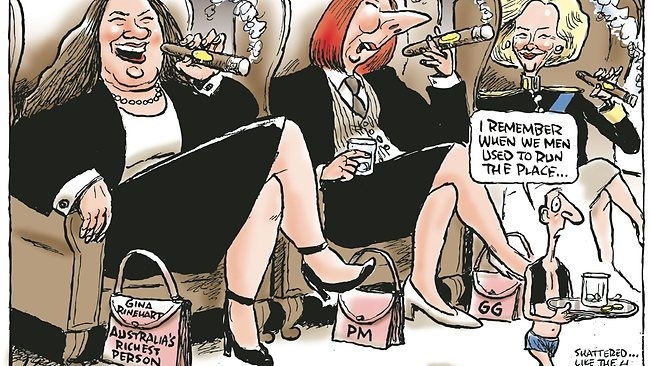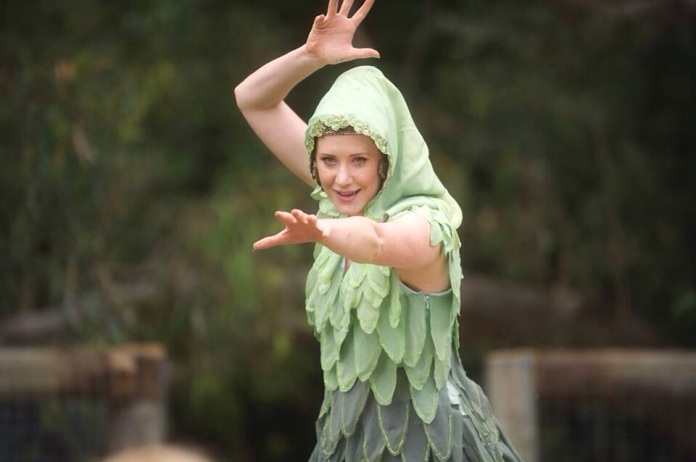It has been a while since I’ve written about individual shows. In truth, this is because I’ve avoided the theatre lately. I’ve written in the past about my goal to be the most enthusiastic person in the audience as the lights go down. I’ve conditioned myself: lights dim and my heart races. I hold myself up to very high standards and will only go if I know I can enter the room with a loving intellectual commitment to immerse myself in the work. But it turns out that directing full-time in the last five weeks of your Masters is very draining. Who would have guessed? It took a while to recover but the burn has finally subsided and I’ve been so delighted to return to live theatre in the last two days. There is nothing like it.
I kicked off the year with Essential Theatre’s A Midsummer Night’s Dream, performed in the vineyards of Deviation Road winery in the gorgeous Adelaide Hills. The production was sheer fun. The audience’s obvious delight at every plot twist thrilled me.
Okay so, spoiler alert: Titania falls in love with a man with a donkey’s head. I thought we all knew this but, as one, the audience exclaimed with delight at the deliciousness of this wacky twist! Speaking afterwards with one of the actors, David Lamb, about this response, he spoke of the joy of touring regional areas and having audience members tell them that this was their first theatre show: “The thing about Shakespeare is that he makes his audience feel smart: you see where things are headed just before they get there.”
This is not to imply that someone who does not see theatre often is dumb, but you could easily expect them to feel isolated in Shakespeare: to be daunted by the language and to be playing a constant game of catch-up. But it was not so. The audience felt respected. They were in on the joke. The kids in their fairy capes, the regular theatre-goers and the locals for whom this was a one-off treat were all equalised by this performance. This was Shakespeare, we all got it and it was fucking hilarious.
That is the beautiful thing about Shakespeare. One of the beautiful things. The other is that I can see that production one night and the next see Foul Play’s Macbeth: two plays by the same author, a night apart and a world away.
You see, within Shakespeare is an implicit consent: we enter the theatre/vineyard/garage/alley with an awareness that we could be seeing anything. It isn’t simply that copyright has expired and directors don’t feel a need to please an estate, it is also that every theatre maker feels empowered to paint the work with their own colours; to plant their flag and declare their voice in his words; to appropriate, re-create, deviate, abbreviate; to separate themselves from their colleges and make clear to us their intentions. This can lead to some incredible theatre but it can also be dangerous as artists attempt to cram a script into a framework that it may not be suited to.
Macbeth is the first show for Foul Play and I wholeheartedly believe that this team could create something very exciting. They are committed and they made very bold choices: we saw the production twice, once with an all-female cast and then again with an all-male cast. Such bravery makes me very optimistic that their future shows will be similarly bold.
I am not here to review. This blog is here to talk about the experience of being an artist and to give a voice to our passionate, brilliant, humble community. I am not writing to critique either company. I am writing this because I had two very different experiences as an audience member in Shakespeare plays twenty-four hours apart. I am writing this because Essential Theatre wanted to share something with me as an audience-member. They wanted to share a passion for beautiful words, to create beautiful memories and to empower their audience, enthuse and infuse them with old words still hysterically funny and truthful.

Cartoon by Mark Knight which first appeared in Murdoch press June 20th, 2012 to accompany an Andrew Bolt column.
The director’s notes for Macbeth say that the production grew out of ‘frustration at the disparity between how men and women in positions of authority are evaluated.’ She wanted to offer us the opportunity to face our own prejudices by seeing the same roles played out by both genders. This is very rich subject matter and made me think of the outstanding Quarterly Essay by Anna Goldsworth: Unfinished Business, sex, freedom and misogyny. In it Goldsworthy talks about how dangerous and sexualised language gets when it comes to women in power. Consider the language used to describe Gina Rinehart as opposed to similarly ruthless, compassionless multimillionaire, Clive Palmer. Rinehart’s own father, Lang Hancock, famously wrote “Allow me to remember you as the neat, trim, capable, attractive young lady of the Wake Up Australia Tour, rather than the slothful, vindictive and devious baby elephant you have become… I am glad your mother cannot see you now.” Barry Humphries on Q&A (May, 2012) described the possibilities for satirical material as “never-ending. It’s just like the hole; Gina’s hole.” Criticism from both the left and the right cannot stop with her actions. Rather, they must comment on her body, her size, her hair and the very fact that she has a vagina. I won’t even get started on Julia Gillard but there is no denying that, in Australia in particular, the body of a woman in power is a thing to be beaten, berated, sexualised and humiliated. Pass comment on her fat arse, make a ‘joke’ menu out of her ‘red box’ and threaten the feminist bloggers with rape to shut them up: it is part of what makes Australia great.
There is so much richness when it comes to discussions of gender and power but did I get any of this from Macbeth?
In repeating the performance twice, the production felt like an experiment rather than a show and I, a subject rather than an independent audience member. I felt dumb in both senses of the word. To me it felt cold and overtly schematic. The actors did not seem to entirely own their performances as both casts were re-creating discoveries made by a completely different group. But the bigger issue is this: in repeating the production with two different gendered ensembles, a play which has always contained themes of gender, sex and power, became strangely sexless. Rather than making a male and a female version, they made two identically gender-neutral versions. To give the most simplistic of examples, the production was set in a prison and I can tell you now that the easiest way to smuggle anything in or out of that prison would be to stow it beside your cock, between your breasts or up your vagina. These parts of the actors’ bodies were invisible to their guards in every search. A strange censorship seems to have descended over the stage: mouths spoke atop pixelated torsos. Pronouns were thrown about without seeming to land on anyone. Did this challenge me to reconsider authority under the lens of gender? Not really. It all but removed gender from a play once full of it.
I think this is a reminder to artists that sometime, when you want to make a play about a very particular contemporary issue, perhaps you should turn to contemporary voices. Perhaps your own. Perhaps, for all Shakespeare’s adaptability and universality, sometimes he can’t say it all without a very strong, very aggressive dramaturgical team questioning every step of the process. Perhaps, in superimposing our play on his, we mire and muddy not only his intention but our own.
Again, I do not write this as a critic. If I were a critic I would mention the outstanding sound design by Dan Thorpe and the commitment of the cast and all those other positive things that are worth a mention in a review. But as an artist, I write this: sometimes we are ambitious. Sometimes that ambition is driven by an urgency to convey a particular theme or lesson. At such times we must ensure that our work is not simply a didactic vessel for, if we miss the mark a little, there must still be a heart and a story to be shared with our willing audience.
My thanks go out to my sister Hannah for her proof-reading and to David Lamb and John Kachoyan for their contribution and to Jane Howard for being my theatre date.
Programming note: I don’t usually provide a disclaimer. Writing as a Victorian theatre maker in Victoria I presume you presume that I know people in every production and I feel that I’m quite good at separating analysis from friendship. But, because I’m currently in SA and because I’m writing about two different companies in this post, I will say that I know several members of Essential Theatre and have no connections to Foul Play.

